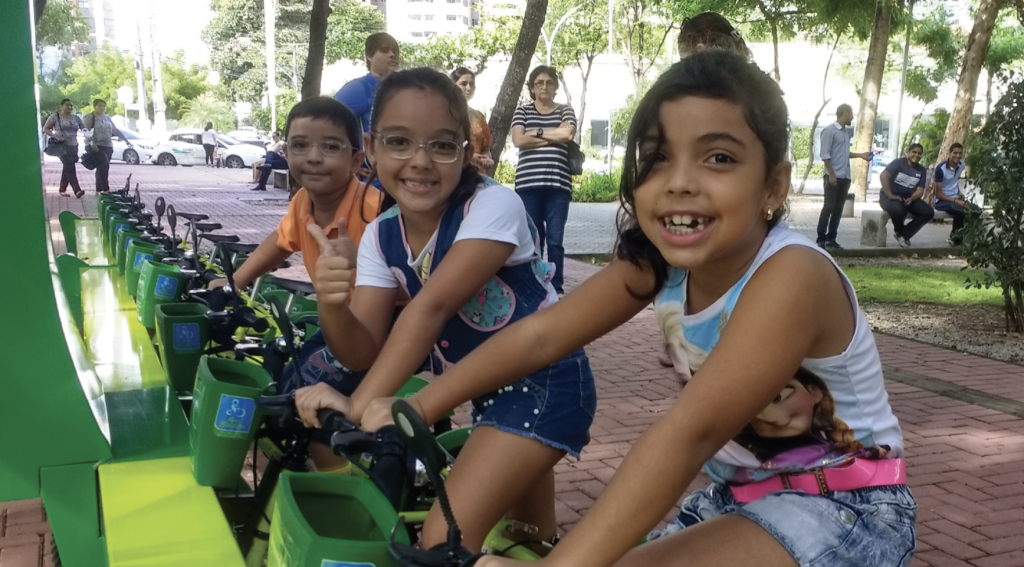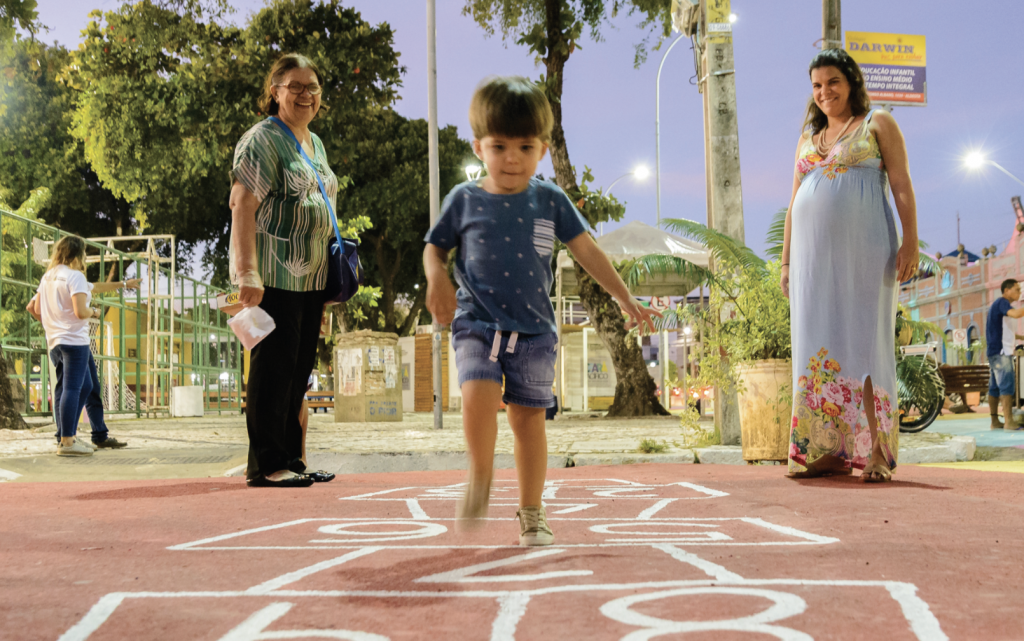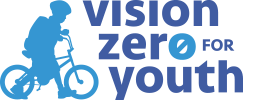Fortaleza, Brazil: Creating safer streets starting where youth walk and bike with the goal of building safer, healthier communities for everyone
Winner of the 2020 Vision Zero for Youth Leadership Award! View the press release.
Download this Success Story as a PDF.
The city of Fortaleza, Brazil has earned much recognition for its strong priority for mobility and safety for all road users. Its child-focused practices show an appreciation for the unique importance of play and community in child development, the need for child-friendly spaces, and the opportunity to choose active transportation from an early age. By building systems with children’s perspectives already in mind rather than as an afterthought, they are raising generations of thoughtful road users.

The city of Fortaleza, Brazil has earned much recognition for its strong priority for mobility and safety for all road users. Its child-focused practices show an appreciation for the unique importance of play and community in child development, the need for child-friendly spaces, and the opportunity to choose active transportation from an early age. By building systems with children’s perspectives already in mind rather than as an afterthought, they are raising generations of thoughtful road users.
Creating a Culture of Walking and Bicycling
Fortaleza has implemented two innovative programs to help foster a culture of active transportation in for its young residents. Mini Bicicletar, is a bike-sharing program that provides child-sized rental bicycles with retractable training wheels. With bikes at five strategic, communal locations, its first few months of operation garnered over 6,000 rides (around 36 per day)1.
When Fortaleza’s Sunday leisure cycling lane program began in 2014, the city didn’t have the strong cycling culture it has today. For many people, the Sunday leisure cycling lane was their first experience with cycling in the streets with their families. Now, the city has 23.7 kilometers of streets on this program, and it is common to see entire families cycling together with their kids using Mini Bicicletar.
Traffic Calming Measures to Decrease Speed
In late 2017, city officials in Fortaleza, in concert with partners from NACTO – Global Designing Cities Initiative, the Bloomberg Initiative for Global Road Safety, World Resources Institute, and Albert Sabin Children’s Hospital targeted the roadway in front of the hospital for safety improvements (for example, raised crossings, curb extensions, and sidewalk refurbishment). For families of children with special health needs who often arrive by bus or on foot, the streets and sidewalks surrounding the facility were in such disrepair that approximately one-half were forced to walk or carry their children in the roadbeds2.
After road treatments were implemented in the hospital’s neighborhood:
- Traffic speed dropped by 42%
- The number of pedestrians forced into the roadbed dropped by 86%
- Zero child pedestrians were forced into the roadbed
- Focusing on the Whole Child

Fortaleza is reclaiming areas traditionally used only by motorized vehicles and reconceptualizing them as areas for pedestrians and embraced by communities. In 2017 Cidade da Gente (or “City of the People”), took 1,200 square meters of parking lots, roadways, and other car-centric spaces and created communal areas for recreation, education, and activity. For fifteen days, space allocation for pedestrians was increased from 29% to 73%3. The new, vibrantly painted areas for play and gathering saw a nearly 60% increase in children using the area. The short-term project was so well-received by residents, the changes remained and have been made permanent. Since 2015, the city has already reclaimed 12,000 square meters for children and all other ages.
Fortaleza’s first lady, Carolina Bezerra, leads a program called “Fortaleza Amiga da Criança,” with the goal of improving public services and spaces offered to children, particularly in neighborhoods with the greatest needs. Additionally, the Childhood Alliance – an inter-agency collaborative focused on child health and wellbeing – ensures children not only have the right to stay safe from physical harm as they travel, but that their psychosocial needs for engaging meaningfully in environments are given equal consideration when forming and guiding policy. The Alliance holds weekly meetings to ensure accountability on more than fifty projects.
Prioritizing Youth in Road Safety Policies: Looking to the Future
In Fortaleza, 55% of schoolchildren walk to school. Through a collaboration with NACTO Streets for Kids, the city will be focusing next on the journey to school.
“Caminhos da Escola,” Fortaleza’s Safe Routes to School Program brings together the benefits of low-speed zones and Cidade da Gente’s projects to improve areas around schools, combining critical safety improvements that decrease motorized traffic speeds with the bright colors and fun spaces from Cidade da Gente. This is to both protect and engage students on their way to and from school.
Fortaleza’s new Vision Zero Plan prioritizes children and youth as a crucial inroad to building cross-cutting collaborations required to create sustainable change in the community.
1 http://betterbikeshare.org/2018/01/11/bike-share-kids-brazilian-city-ahead-curve/
3 https://www.itdp.org/wp-content/uploads/2019/05/2019.05.29-Webinar-Fortaleza-ITDP_v00-1.pdf
